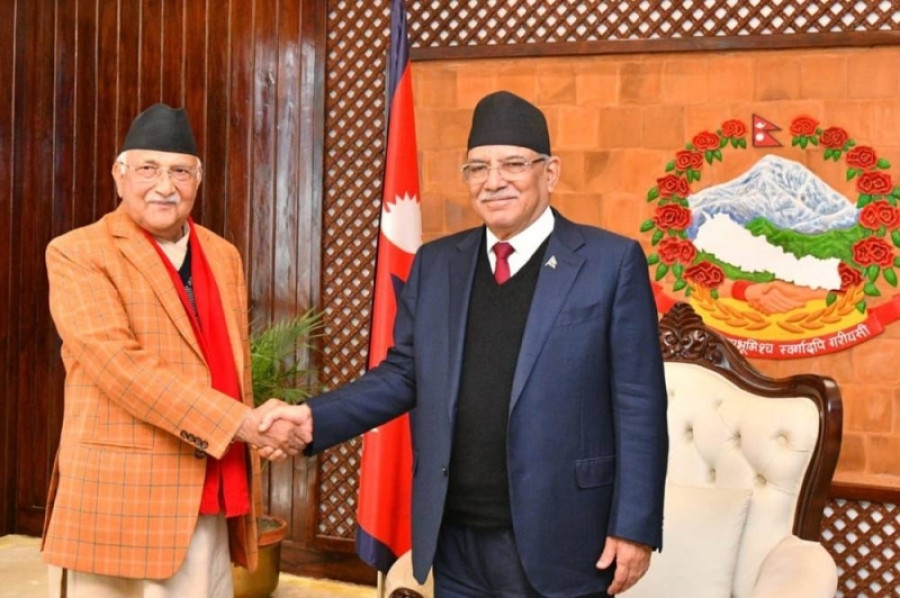Politics
New coalition partners cement comradeship with 8-point deal
Maoist Centre to get upper house chair. PM’s post to be divided between Dahal and Oli.
Binod Ghimire
In a dramatic political development, the year-long Nepali Congress and CPN (Maoist Centre) coalition collapsed on Monday, with Prime Minister Pushpa Kamal Dahal joining hands with the CPN-UML to revive the “left alliance.”
Despite contesting the elections in a pre-poll alliance with the Congress, the Maoist Centre Chairman Dahal had become prime minister on December 26, 2022 with the UML’s support. But the partnership couldn’t last long after his party decided to support the Congress in the presidential election. The UML had pulled out of the government on February 27 last year.
Exactly a year later, Dahal changed his coalition partner to side with the UML again and restructured his Cabinet. He has inducted a minister each from his party, the UML and the Rastriya Swatantra Party (RSP). Hit Bahadur Tamang from the Maoist Centre, UML’s Padam Giri and Dol Prasad Aryal of the RSP have become ministers in the Dahal Cabinet. President Ramchandra Paudel administered them oath of office and secrecy as ministers without portfolio. Their ministerial portfolios will be assigned later, as per the statement from the President’s Office.
The Dahal-led four-member Cabinet was constituted, relieving all ministers of their responsibilities. The Congress ministers didn’t resign, waiting for the prime minister to sack them. They argue that it was the Maoist Centre that broke the alliance, not them. Dahal has for now kept all the ministries with him.
A meeting of the top leaders of the Maoist Centre, UML, RSP and Janata Samajbadi Party has decided not to include the fifth largest party in the lower house, the Rastriya Prajatantra Party, in the ruling alliance, citing the party’s advocacy for a Hindu kingdom. They also have forged an eight-point deal signed by Dahal along with UML chair KP Sharma Oli, RSP chairperson Rabi Lamichhane and Samajbadi Party chief Upendra Yadav.
“The [new] coalition has been formed among like-minded parties for good governance, development, social justice and prosperity. The government will be led by Maoist Centre chair Pushpa Kamal Dahal,” reads the first point of the agreement. The four parties have agreed to support the Maoist Centre in the election of National Assembly chair while they will back a UML candidate for vice-chair of the upper house.
The position of upper house chair has fallen vacant after Ganesh Timilsina, who was elected from the UML, completed his six-year term on Sunday. The election for the chair has been slated for March 12.
Urmila Aryal, elected from the Maoist Centre, holds the vice-chair position. As the constitution doesn’t allow lawmakers from the same party to hold both the positions, Aryal will have to quit before the Maoist Centre fields its candidate for chairperson. It is possible that either Aryal or Jhakku Prasad Subedi will be the chairperson candidate from the Maoist Centre. With 17 seats, the Maoist Centre is the largest party in the upper house.
Sharing of the ministries on mutual agreement based on the specialities is another point the parties have agreed upon. “Ministerial portfolios will be distributed after ascertaining the number of parties joining the government. That will also determine the ministries the ruling parties get,” Santosh Pariyar, RSP chief whip, told the Post.
The four parties want to bring on board the Madhav Kumar Nepal-led CPN (Unified Socialist), but it remains noncommittal. Janamat Party and Nagarik Unmukti Party are also in negotiations to join the government.
The four parties have a combined 142 members—the UML has 77, the Maoist Centre 32, the RSP 32 and the Janata Samajbadi 12—in the 275-strong lower house, way more than needed for a simple majority.
While there has been a tentative agreement that the Maoist Centre will get the Ministry of Finance, both the UML and the RSP have staked claim over the Home Ministry. A four-member panel comprising Bishnu Paudel, vice-chair of the UML, Maoist Centre Deputy General Secretary Barsha Man Pun, Lamichhane, and Yadav have been formed to settle the sharing of ministries.
Concluding all the tasks relating to the peace process including amending the transitional justice law, preparing laws needed for effective implementation of federalism and making all three tiers of government effective are the other points of the agreement. Likewise, another point covers preparation of a common minimum programme to guide the government’s performance.
“The four parties agree to move ahead by protecting and promoting sovereignty and national integrity,” according to the agreement. The eight-point agreement, however, doesn’t talk about sharing the prime ministerial position. “As far as I know, there has been a gentleman's agreement that the Maoist Centre and the UML will each lead the government for two years,” said a leader close to Oli. “Our party will lead the election government.” Around four years are left for the periodic general elections.




 20.12°C Kathmandu
20.12°C Kathmandu















